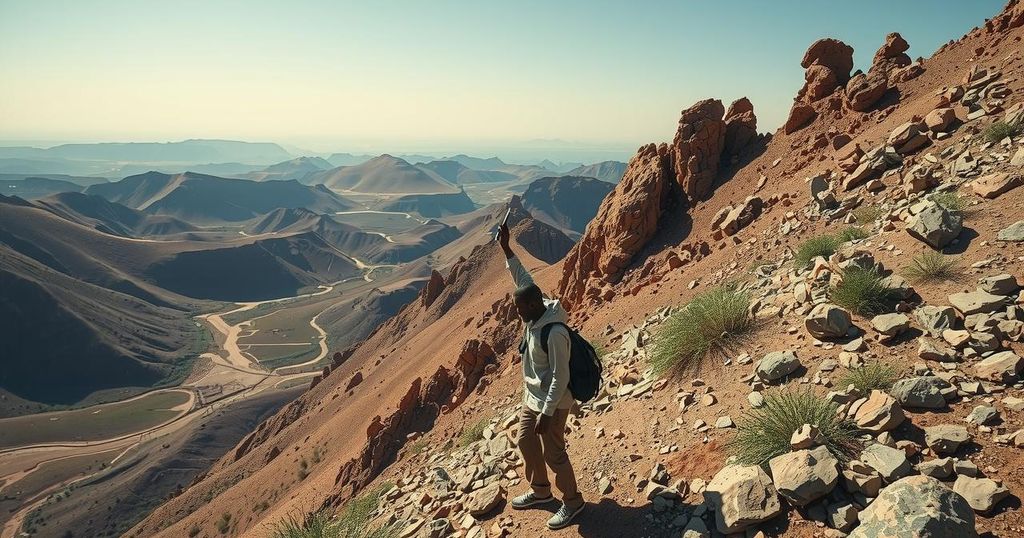World news
AFRICA, ASIA, CAIRO, CEASEFIRE, CHAD, CIVIL WAR, COMMITTEE TO PROTECT, CONFLICT, DARFUR, EGYPT, EL - GENEINA, GAZA, GAZA STRIP, GEDAREF, HUMANITARIAN CRISIS, IBRAHIM, NOON, NORTH DARFUR, RAPID SUPPORT FORCES, REPORTERS WITHOUT BORDERS, RSF, SUDAN, TAWILA, TO PROTECT JOURNALISTS, UN, UNION, WAR, WEST DARFUR
Fatima Khan
0 Comments
Sudan’s Journalists: Fearless Foot Soldiers of Truth Amid War
Sudanese journalists are risking their lives to report on the ongoing war and humanitarian crisis, facing violence, displacement, and communication challenges. While many have fled the country, some remain to document the atrocities occurring in Darfur amidst threats from the Rapid Support Forces. Their efforts are vital in bringing attention to the situation, despite severe personal risks and limited resources.
In Sudan, journalists are undertaking perilous journeys to report on the ongoing war, risking their safety to communicate the dire situation in Darfur. Communication infrastructure has been severely damaged over the past two years, prompting them to climb mountains in search of a signal from neighboring Chad to send urgent reports of atrocities, including sexual violence and ethnic massacres.
The fighting that commenced in April 2023 between the army and the paramilitary Rapid Support Forces (RSF) has been lethal for journalists, with a reported 28 fatalities and numerous instances of detentions and torture. Many journalists have also been displaced, facing systemic outages of electricity, water, and internet.
A freelance journalist, referred to as Noon for her safety, recounted being forced to flee El-Geneina due to threats following her reporting on mass killings perpetrated by the RSF and its allies. She indicated that three raids on her family’s home urged her to escape with her family to Gedaref, over 1,800 kilometers away. However, she faced arrests by the army, which compelled her to submit future stories for government approval.
According to Reporters Without Borders, an alarming number of over 400 journalists have fled Sudan amidst the conflict. Nevertheless, some journalists continue working discreetly, like Ibrahim, a photojournalist in North Darfur, who risks his life to capture the plight of individuals caught between famine and violence. He maintains anonymity due to fears of arrest and torture, having previously experienced five days of torture at the hands of RSF fighters.
The climate for journalism in Sudan has historically been challenging, and the current conditions have only worsened since the onset of conflict. Many journalists can no longer operate as they once did, forced into alternative livelihoods. Veteran reporter Youssef, aged 62, has resorted to raising livestock and cultivating crops after losing contact with his newspaper amid continuous violence in his area.
Despite the dangers, some journalists remain committed to ensuring that the stories of those suffering in Sudan are heard. Ibrahim has converted a coffee shop in Tawila into a makeshift newsroom to disseminate news. His determination is evident as he states, “No one else will tell these stories. No one can imagine the atrocities happening here.”
In conclusion, journalists in Sudan exhibit extraordinary courage and resilience in the face of extreme danger, striving to report the truth about the ongoing conflict. Despite overwhelming obstacles, including violence, arrests, and lack of support, they continue to document the atrocities occurring in Darfur. Their commitment is critical in raising awareness of the dire humanitarian situation as they risk their lives for the sake of truth and accountability.
Original Source: www.france24.com




Post Comment